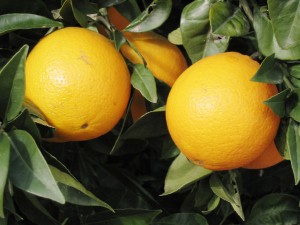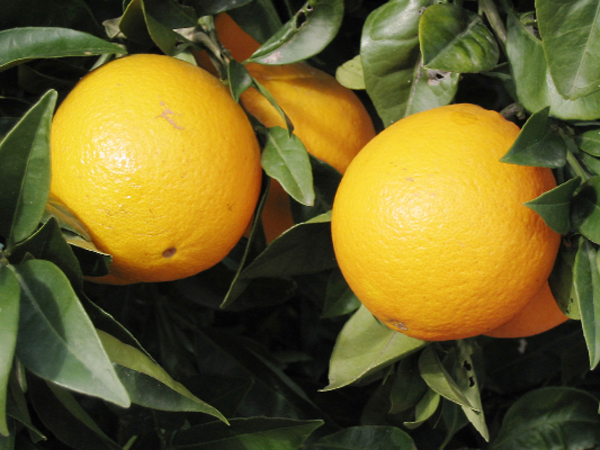Two senior officials of the Caribbean Citrus Growers Association (CCGA), a Trinidad and Tobago-based company, have been meeting with local officials and visiting areas of Tacama in the interior savannahs as the Association prepares to pump around US$25m into the creation of the largest ever citrus-growing operation in Guyana,
 CCGA President Felix Clarke told Stabroek Business that the Association is awaiting the ‘green light’ from government over the acquisition of 5,000 acres of land in the Tacama savannahs for the citrus project. Clarke told Stabroek Business that the project will focus on the cultivation of several varieties of citrus including Valencia orange, White Marsh Grapefruit and Willow Leaf Mandarin. He said that the CCGA is seeking to partner with local farmers in the Tacama savannahs. “What we are hoping is that the project will eventually comprise between 15,000 and 30,000 acres of citrus under cultivation,” Clarke noted. CCGA Vice President Kenrick Jasper said that part of the objective of the project was to support the broader agricultural pursuits of small farmers in the Savannah areas.
CCGA President Felix Clarke told Stabroek Business that the Association is awaiting the ‘green light’ from government over the acquisition of 5,000 acres of land in the Tacama savannahs for the citrus project. Clarke told Stabroek Business that the project will focus on the cultivation of several varieties of citrus including Valencia orange, White Marsh Grapefruit and Willow Leaf Mandarin. He said that the CCGA is seeking to partner with local farmers in the Tacama savannahs. “What we are hoping is that the project will eventually comprise between 15,000 and 30,000 acres of citrus under cultivation,” Clarke noted. CCGA Vice President Kenrick Jasper said that part of the objective of the project was to support the broader agricultural pursuits of small farmers in the Savannah areas.
Clarke said that Prime Minister Patrick Manning was acutely aware of the strategic importance of Guyana to regional agriculture and had given his own blessings and the backing of his government for the project.
And according to Clarke the CCGA is “very close” to tying up its land-acquisition discussions with the governent. Clarke said that during recent discussions with the Lands and Surveys Department assurances had been given that the land would be made available soon. Clarke told Stabroek Business that the CCGA is hoping to make a start to the project “based on acquisition of the savannah lands” by the end of this year.
However, according to Clarke the Association has decided that it will not “sit back and wait” to state approval to secure the lands. “What we have decided to do in partnership with a local farmer is to begin to set up the nurseries. This farmer already has an extensive operation in the Tacama area and we have had a relationship with him for some time now,”
The CCGA Tacama Savannahs project includes the establishment of a processing factory which, Clarke saud, “ought to be up and running within the next five to six years, Clarke said, however, that citrus cultivated prior to the completion of the factory will be marketed in Barbados, Antigua and elsewhere in the region as fresh fruit,
Technical Adviser to the CCGA project, Guyanese Agronomist Rowland Fletcher told Stabroek Business that he had already been in touch with the National Agricultural Research Institute (NARI) in connection with the setting up of nurseries. Fletcher said that there was need, in the first instance, to secure bud wood for the setting up of a parent nursery since the local sources of planting material were heavily contaminated with viruses. “Initially, we will be looking to Trinidad as our source of bud wood failing which we will look overseas,” Fletcher said. He said that the nursery programme is scheduled to commence before the end of November.
The CCGA was established in 1955 and runs fruit production operations in Trinidad and Tobago and in Belize.
Clarke said that eight years ago the Association divested part of its interests in the Belize citrus industry but continues to hold a 21 per share in a 2,000 acre estate in Belize. Clarke said that the Guyana project represented a relocation of that part of its operations which it had closed downin Belize. “The move to Guyana happened for logistical reasons. Presently, we get ninety per cent of our raw material from Belize and shipping costs to Trinidad are monumental, We anticipate that over time our investment in Guyana will result in considerable savings.”
The project envisages the cultivation of various companion crops, including pigeon peas, sorrel and hot peppers from which, according to Jasper, the company will be seeking an income,
Meanwhile, Clarke told Stabroek Business that Trinidad and Tobago’s citrus requirements amount to “between US$5m and US$8m annually and that the Tacama project will be seeking, first, to satisfy the Trinidad market before setting its sights on extra-regional markets.










